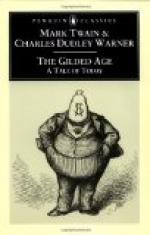“No. Old man Bolton’s behind him. He has capital, but I judged that he wanted my experience in starting.”
“If he wants me, tell him I’ll come, after Congress adjourns. I should like to give him a little lift. He lacks enterprise—now, about that Columbus River. He doesn’t see his chances. But he’s a good fellow, and you can tell him that Sellers won’t go back on him.”
“By the way,” asked Harry, “who is that rather handsome party that’s hanging ’round Laura? I see him with her everywhere, at the Capitol, in the horse cars, and he comes to Dilworthy’s. If he weren’t lame, I should think he was going to run off with her.”
“Oh, that’s nothing. Laura knows her business. He has a cotton claim. Used to be at Hawkeye during the war.
“Selby’s his name, was a Colonel. Got a wife and family. Very respectable people, the Selby’s.”
“Well, that’s all right,” said Harry, “if it’s business. But if a woman looked at me as I’ve seen her at Selby, I should understand it. And it’s talked about, I can tell you.”
Jealousy had no doubt sharpened this young gentleman’s observation. Laura could not have treated him with more lofty condescension if she had been the Queen of Sheba, on a royal visit to the great republic. And he resented it, and was “huffy” when he was with her, and ran her errands, and brought her gossip, and bragged of his intimacy with the lovely creature among the fellows at Newspaper Row.
Laura’s life was rushing on now in the full stream of intrigue and fashionable dissipation. She was conspicuous at the balls of the fastest set, and was suspected of being present at those doubtful suppers that began late and ended early. If Senator Dilworthy remonstrated about appearances, she had a way of silencing him. Perhaps she had some hold on him, perhaps she was necessary to his plan for ameliorating the condition the tube colored race.
She saw Col. Selby, when the public knew and when it did not know. She would see him, whatever excuses he made, and however he avoided her. She was urged on by a fever of love and hatred and jealousy, which alternately possessed her. Sometimes she petted him, and coaxed him and tried all her fascinations. And again she threatened him and reproached him. What was he doing? Why had he taken no steps to free himself? Why didn’t he send his wife home? She should have money soon. They could go to Europe—anywhere. What did she care for talk?
And he promised, and lied, and invented fresh excuses for delay, like a cowardly gambler and roue as he was, fearing to break with her, and half the time unwilling to give her up.
“That woman doesn’t know what fear is,” he said to himself, “and she watches me like a hawk.”
He told his wife that this woman was a lobbyist, whom he had to tolerate and use in getting through his claims, and that he should pay her and have done with her, when he succeeded.




